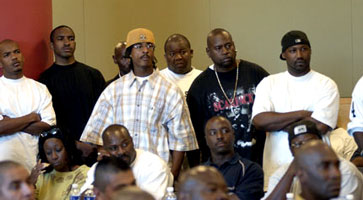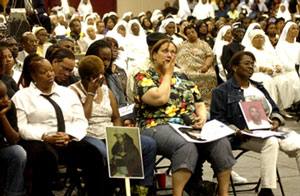Gang wars report proves racial targeting of Black males
By Askia MuhammadSenior Correspondent | Last updated: Aug 5, 2007 - 8:57:00 PM
What's your opinion on this article?

Audience listens closely as Minister Farrakhan addressed West Coast gang summit in Los Angeles, June 20, 2005. Photos: Kenneth Muhammad
'An unwritten law among the slave masters of our fathers and among the children of the slave-masters today is that Black people must never be allowed to organize. Whenever there are Bloods, Crips, Black Gangster Disciples, El Rukns, or the Nation of Islam, the Black Panther Party or anybody that sees the value of coming together as an organized unit, you become dangerous.' —The Honorable Minister Louis Farrakhan |
Though it is a popular U.S. political cliché to simply “lock them up and throw away the key,” this prevailing so-called criminal justice policy has, in fact, a negative affect on gang participation by young people, according to the new study.
The study reflects an age-old American social policy concerning non-Whites: Domination of people of color, the destruction of their family structure and the imprisonment of their men, now more and more, for profit.
Drugs, violence, police harassment of gangs, and a racially disproportionate arrest and incarceration rate are pillars of that policy.
In Los Angeles, gang membership doubled according to the study, which suggests more focus on keeping children from joining gangs. “More police, more prisons, and more punitive measures haven’t stopped the cycle of gang violence,” the study states in its executive summary. “Los Angeles is losing the war on gangs.”
Meanwhile, as law enforcement agency budgets have swollen, they have increasingly targeted Blacks.
According to federal data, Blacks make up just 13 percent of the nation’s illicit drug users, but they are 32 percent of those arrested for drug violations and 53 percent of those incarcerated in state prisons for drug crimes.
The report argues that targeting gang members and putting them in prison to serve time with other gang members actually strengthens gang ties.
“We’re talking about 12-, 13-, 14-, 15-year-olds whose involvement in gangs is likely to be ephemeral unless they are pulled off the street and put in prison, where they will come out with much stronger gang allegiances,” said Judith Greene, co-author of the Report.
The practice among law enforcement agencies however, is to always favor tough tactics ahead of social, intervention techniques. “There is a tendency, because they think that’s the only way to deal with it, and particularly since 9-11, and with the problems going on around al-Qaeda, and the stepped up equipment the government is pouring into law enforcement agencies,” Ronald Hampton, President of the National Black Police Association told The Final Call. “They just want to use force. They just want to pull them over, stop, search. All those kinds of things.

The Honorable Minister Louis Farrakhan delivered inspirational words to young men and women during a "Stop the Killing" rally at Compton College on June 22, 2005. Minister Farrakhan stood with mothers who have lost their children to violence in their communities (pictured holding the photos of their dead loved ones), evoking tears of reflective pain from many in the audience when he spoke of how terrible it is to rob a mother of her child.
|
Chicago in particular, the study states, showed that “a cycle of police suppression and incarceration, and a legacy of segregation, have actually helped to sustain unacceptably high levels of gang violence.” The report also criticizes politicians who overstate the threat of criminal gangs and seek tougher sentences.
“These approaches, although they sound novel, are just old wine in new bottles,” said Ms. Greene. “Gang crime and violence in poor urban neighborhoods have been a problem since the latter parts of the 19th century.” The report says Los Angeles and Chicago are losing the war on gangs because they focus on law enforcement and are short on intervention.
In 2005, Chicago police made 47,000 arrests for drug offenses, and 79 percent of those arrests were of Blacks, according to the Illinois Criminal Justice Information Authority. And, studies show that more than 70 percent of the Illinois illicit drug users are White, while 14 percent are Black. But 65 percent of arrests for drug offenses are of Blacks. And 66 percent of inmates in Illinois prisons for drug offenses are Black, and Illinois’ incarceration rate of Blacks for drug possession is the highest in the country according to a report published in the Chicago Tribune July 22.
The gang report criticizes such actions and argues that the focus on gangs is based in part on some commonly held stereotypes—that most or all gang members are hardened criminals, that they spend most of their time planning crimes, or that they are responsible for the bulk of violent crime in a community. The research shows that gang members account for a small share of violent crime and much of the crime is self-serving, with the gangsters spending whatever they earn in their criminal activities on themselves.
The truth is, the jail itself has become a marketable commodity.
“Why do you think the only industry thriving today is the industry of prisons? Why do you think prisons are now on the stock market? People are investing in the prospect of Blacks and Latinos filling the jails,” the Honorable Minister Louis Farrakhan told a peace meeting among Bloods and Crips in Newark, N.J. on Dec. 11, 2004. That is the “aim of the government,” he shared with the Brothers and Sisters who were present.
Gangs, or street organizations, are often surrogate “families” for their members. Since Blacks lived on slave plantations, the family structure has been all but non-existent, and U.S. social policy has undermined its development.
“An unwritten law among the slave masters of our fathers and among the children of the slavemasters today is that Black people must never be allowed to organize,” said Minister Farrakhan. “Whenever there are Bloods, Crips, Black Gangster Disciples, El Rukns, or the Nation of Islam, the Black Panther Party or anybody that sees the value of coming together as an organized unit, you become dangerous.
“The enemy does not want a replication of a nervous system developed among us, as a people, that when one of us aches, all of us feel that pain. When we are connected like that, we will stop the enemy’s evil treatment of us all over the country. You will not have to ask him to stop police brutality, we will stop it ourselves when we feel each others’ pain,” said Minister Farrakhan.
For its part, this latest gang report is clear: The research shows that social service programs are far more effective at reducing violence than tough gang enforcement.
“You also have to look at issues around jobs and education. And I’m talking about education that is going to be informative in the way to push young people away from gangs,” said Mr. Hampton. “The strict law enforcement approach to dealing with the gang problem hasn’t worked.
“Several methods are being used in some places like Montgomery County (Md.), where they’re going after the gang problem utilizing a public health approach, with wrap-around services to provide certain kind of social services, jobs for young people who are involved in gangs. Getting them involved in the process of helping other young people get out of gangs or never join gangs. Those have been the most effective and efficient methods, in terms of dealing with the gang problem and reducing the violence associated with gangs,” said Mr. Hampton.
“You cannot ask the Brothers to put their guns down, if you do not have anything for them to do in return. You cannot give them lip service. Brothers have children; Brothers need jobs and income,” said Minister Farrakhan.
The solution is organization and mobilization, according to Minister Farrakhan. Street organization members and others must mobilize all over the country, the way cities organized for the Million Man March in 1995, which saw members of rival street organizations embrace as Brothers. The call for organization and mobilization continued at the 10th anniversary of the Million Man March/Millions More Movement.
Gang members, and Muslims and Christians alike, must extend the “family” feeling beyond, the “tribe” or “clan” to which we belong individually, said Minister Farrakhan. “What supports our peace has to be the principle, ‘I treat you like I want you to treat me.’ This is a code of righteous conduct. Peace with a righteous code supporting it produces love.”
And there’s a way to tell when we are achieving that goal: “...if somebody can kill our Christian family and we, as Muslims, do not feel their pain, then we are disconnected,” said Minister Farrakhan.
“If somebody can hang one of our Brothers in Georgia and we read about it in Newark, but do not feel the pain, then we are not tied to each other. In the ’60s, we could not watch television in Newark and see dogs and fire-hoses aimed at Black people in Alabama and Mississippi, and not feel the pain.”
Related news:
Gangs Report (Executive Summary, PDF Format)
Gangs Report (Full Report, PDF Format)
A Special Message to Street Organizations (FCN, 08-05-2007)
Amidst accusation of violence against police, gang truce continues (FCN, 08-22-2005)
Federal gangbusters bill legitimizes sinister measures (FCN, 06-02-2005)
New Jersey Gang peace treaty holds one year later (FCN, 02-02-2005)
Newark gangs sign treaty to end hostility, agree to Bring the Peace (FCN, 07/10/2004)
Secret ties between CIA, drugs revealed (FCN, 1996)
INSIDE STORIES AND REVIEWS
-
-
About Harriett ... and the Negro Hollywood Road Show
By Rabiah Muhammad, Guest Columnist » Full Story -
Skepticism greets Jay-Z, NFL talk of inspiring change
By Bryan 18X Crawford and Richard B. Muhammad The Final Call Newspaper @TheFinalCall » Full Story -
The painful problem of Black girls and suicide
By Charlene Muhammad -National Correspondent- » Full Story -
Exploitation of Innocence - Report: Perceptions, policies hurting Black girls
By Charlene Muhammad -National Correspondent- » Full Story -
Big Ballin: Big ideas fuel a father’s Big Baller Brand and brash business sense
By Bryan Crawford -Contributing Writer- » Full Story






 Click Here Stay Connected!
Click Here Stay Connected!








